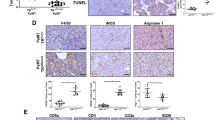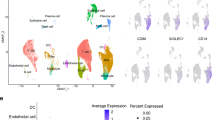Abstract
Tumor-associated macrophages (TAMs) constitute a major component of the immune cell infiltrate observed in the tumor microenvironment (TME). Factors present in the TME, including tumor growth factor-β (TGF-β), allow tumors to circumvent host-mediated immune responses to promote tumor progression. However, the molecular mechanism(s) involved are not clear. Toll-like receptors (TLRs) are important mediators of innate immune responses by immune cells, whose activation triggers the production of molecules required for anti-tumoral responses. Interleukin (IL) receptor-associated kinase (IRAK)-M is an inactive serine/threonine kinase, predominantly expressed in macrophages and is a potent negative regulator of TLR signaling. In this study, we show that TAMs express significantly higher levels of IRAK-M compared with peritoneal macrophages in a syngeneic mouse model of lung cancer. Subcutaneous implantation of Lewis lung carcinoma cells in IRAK-M−/− mice resulted in a five-fold reduction in tumor growth as compared with tumors in wild-type (WT) animals. Furthermore, compared with WT TAMs, TAMs isolated from IRAK-M−/− mice displayed features of a classically activated (M1) rather than alternatively activated (M2) phenotype, as manifest by greater expression of IL-12, interferon-γ (IFN-γ) and inducible nitric oxide synthase. Human lung cancer cells induced IRAK-M expression in human peripheral blood mononuclear cells (PBMCs) when co-cultured together. Tumor cell-induced expression of IRAK-M was dependent on the activation of TGF-β pathway. Similarly, treatment of human PBMCs or mouse macrophage cell line, RAW 264.4, with TGF-β, induced IRAK-M expression. Interestingly, IRAK-M gene expression in 439 human lung adenocarcinoma tumors correlated with poor survival in patients with lung cancer. Together, our data demonstrates that TGF-β-dependent induction of IRAK-M expression is an important, clinically relevant mechanism by which tumors may circumvent anti-tumor responses of macrophages.
This is a preview of subscription content, access via your institution
Access options
Subscribe to this journal
Receive 50 print issues and online access
$259.00 per year
only $5.18 per issue
Buy this article
- Purchase on Springer Link
- Instant access to full article PDF
Prices may be subject to local taxes which are calculated during checkout







Similar content being viewed by others
References
Akira S, Takeda K . (2004). Toll-like receptor signalling. Nat Rev Immunol 4: 499–511.
Akira S, Takeda K, Kaisho T . (2001). Toll-like receptors: critical proteins linking innate and acquired immunity. Nat Immunol 2: 675–680.
Balkwill F, Charles KA, Mantovani A . (2005). Smoldering and polarized inflammation in the initiation and promotion of malignant disease. Cancer Cell 7: 211–217.
Ben-Baruch A . (2006). Inflammation-associated immune suppression in cancer: the roles played by cytokines, chemokines and additional mediators. Semin Cancer Biol 16: 38–52.
Bingle L, Brown NJ, Lewis CE . (2002). The role of tumour-associated macrophages in tumour progression: implications for new anticancer therapies. J Pathol 196: 254–265.
de Vos AF, Pater JM, van den Pangaart PS, de Kruif MD, van ‘t Veer C, van der Poll T . (2009). In vivo lipopolysaccharide exposure of human blood leukocytes induces cross-tolerance to multiple TLR ligands. J Immunol 183: 533–542.
del Fresno C, Otero K, Gomez-Garcia L, Gonzalez-Leon MC, Soler-Ranger L, Fuentes-Prior P et al. (2005). Tumor cells deactivate human monocytes by up-regulating IL-1 receptor associated kinase-M expression via CD44 and TLR4. J Immunol 174: 3032–3040.
Deng JC, Cheng G, Newstead MW, Zeng X, Kobayashi K, Flavell RA et al. (2006). Sepsis-induced suppression of lung innate immunity is mediated by IRAK-M. J Clin Invest 116: 2532–2542.
Edwards BK, Brown ML, Wingo PA, Howe HL, Ward E, Ries LA et al. (2005). Annual report to the nation on the status of cancer, 1975–2002, featuring population-based trends in cancer treatment. J Natl Cancer Inst 97: 1407–1427.
Elgert KD, Alleva DG, Mullins DW . (1998). Tumor-induced immune dysfunction: the macrophage connection. J Leukoc Biol 64: 275–290.
Elliott RL, Blobe GC . (2005). Role of transforming growth factor Beta in human cancer. J Clin Oncol 23: 2078–2093.
Gordon S . (2003). Alternative activation of macrophages. Nat Rev Immunol 3: 23–35.
Hasegawa Y, Takanashi S, Kanehira Y, Tsushima T, Imai T, Okumura K . (2001). Transforming growth factor-beta1 level correlates with angiogenesis, tumor progression, and prognosis in patients with nonsmall cell lung carcinoma. Cancer 91: 964–971.
Jacobsen SE, Keller JR, Ruscetti FW, Kondaiah P, Roberts AB, Falk LA . (1991). Bidirectional effects of transforming growth factor beta (TGF-beta) on colony-stimulating factor-induced human myelopoiesis in vitro: differential effects of distinct TGF-beta isoforms. Blood 78: 2239–2247.
Jemal A, Murray T, Ward E, Samuels A, Tiwari RC, Ghafoor A et al. (2005). Cancer statistics, 2005. CA Cancer J Clin 55: 10–30.
Johnson SK, Kerr KM, Chapman AD, Kennedy MM, King G, Cockburn JS et al. (2000). Immune cell infiltrates and prognosis in primary carcinoma of the lung. Lung Cancer 27: 27–35.
Kim WS, Park C, Jung YS, Kim HS, Han J, Park CH et al. (1999). Reduced transforming growth factor-beta type II receptor (TGF-beta RII) expression in adenocarcinoma of the lung. Anticancer Res 19: 301–306.
Kobayashi K, Hernandez LD, Galan JE, Janeway Jr CA, Medzhitov R, Flavell RA . (2002). IRAK-M is a negative regulator of Toll-like receptor signaling. Cell 110: 191–202.
Kong F, Jirtle RL, Huang DH, Clough RW, Anscher MS . (1999). Plasma transforming growth factor-beta1 level before radiotherapy correlates with long term outcome of patients with lung carcinoma. Cancer 86: 1712–1719.
Letterio JJ, Roberts AB . (1998). Regulation of immune responses by TGF-beta. Annu Rev Immunol 16: 137–161.
Lewis CE, Pollard JW . (2006). Distinct role of macrophages in different tumor microenvironments. Cancer Res 66: 605–612.
Li MO, Wan YY, Sanjabi S, Robertson AK, Flavell RA . (2006). Transforming growth factor-beta regulation of immune responses. Annu Rev Immunol 24: 99–146.
Mantovani A, Bottazzi B, Colotta F, Sozzani S, Ruco L . (1992). The origin and function of tumor-associated macrophages. Immunol Today 13: 265–270.
Mantovani A, Sozzani S, Locati M, Allavena P, Sica A . (2002). Macrophage polarization: tumor-associated macrophages as a paradigm for polarized M2 mononuclear phagocytes. Trends Immunol 23: 549–555.
McCartney-Francis N, Jin W, Wahl SM . (2004). Aberrant Toll receptor expression and endotoxin hypersensitivity in mice lacking a functional TGF-beta 1 signaling pathway. J Immunol 172: 3814–3821.
Moustakas A, Heldin CH . (2003). Ecsit-ement on the crossroads of Toll and BMP signal transduction. Genes Dev 17: 2855–2859.
Mytar B, Woloszyn M, Szatanek R, Baj-Krzyworzeka M, Siedlar M, Ruggiero I et al. (2003). Tumor cell-induced deactivation of human monocytes. J Leukoc Biol 74: 1094–1101.
Naiki Y, Michelsen KS, Zhang W, Chen S, Doherty TM, Arditi M . (2005). Transforming growth factor-beta differentially inhibits MyD88-dependent, but not TRAM- and TRIF-dependent, lipopolysaccharide-induced TLR4 signaling. J Biol Chem 280: 5491–5495.
Pan H, Ding E, Hu M, Lagoo AS, Datto MB, Lagoo-Deenadayalan SA . (2010). SMAD4 is required for development of maximal endotoxin tolerance. J Immunol 184: 5502–5509.
Pardoll D . (2003). Does the immune system see tumors as foreign or self? Annu Rev Immunol 21: 807–839.
Pollard JW . (2004). Tumour-educated macrophages promote tumour progression and metastasis. Nat Rev Cancer 4: 71–78.
Reddy RC, Keshamouni VG, Jaigirdar SH, Zeng X, Leff T, Thannickal VJ et al. (2004). Deactivation of murine alveolar macrophages by peroxisome proliferator-activated receptor-gamma ligands. Am J Physiol Lung Cell Mol Physiol 286: L613–L619.
Rosati O, Martin MU . (2002). Identification and characterization of murine IRAK-M. Biochem Biophys Res Commun 293: 1472–1477.
Scagliotti G, Novello S . (2003). Adjuvant chemotherapy after complete resection for early stage NSCLC. Lung Cancer 42 (Suppl 1): S47–S51.
Schnare M, Barton GM, Holt AC, Takeda K, Akira S, Medzhitov R . (2001). Toll-like receptors control activation of adaptive immune responses. Nat Immunol 2: 947–950.
Seya T, Akazawa T, Uehori J, Matsumoto M, Azuma I, Toyoshima K . (2003). Role of toll-like receptors and their adaptors in adjuvant immunotherapy for cancer. Anticancer Res 23: 4369–4376.
Shedden K, Taylor JM, Enkemann SA, Tsao MS, Yeatman TJ, Gerald WL et al. (2008). Gene expression-based survival prediction in lung adenocarcinoma: a multi-site, blinded validation study. Nat Med 14: 822–827.
Souquet PJ, Geriniere L . (2001). The role of chemotherapy in early stage of non-small cell lung cancer. Lung Cancer 34 (Suppl 2): S155–S158.
Toonkel RL, Borczuk AC, Powell CA . (2010). TGF-beta signaling pathway in lung adenocarcinoma invasion. J Thorac Oncol 5: 153–157.
van ‘t Veer C, van den Pangaart PS, van Zoelen MA, de Kruif M, Birjmohun RS, Stroes ES et al. (2007). Induction of IRAK-M is associated with lipopolysaccharide tolerance in a human endotoxemia model. J Immunol 179: 7110–7120.
Wesche H, Gao X, Li X, Kirschning CJ, Stark GR, Cao Z . (1999). IRAK-M is a novel member of the Pelle/interleukin-1 receptor-associated kinase (IRAK) family. J Biol Chem 274: 19403–19410.
Xiao C, Shim JH, Kluppel M, Zhang SS, Dong C, Flavell RA et al. (2003). Ecsit is required for Bmp signaling and mesoderm formation during mouse embryogenesis. Genes Dev 17: 2933–2949.
Xie Q, Gan L, Wang J, Wilson I, Li L . (2007). Loss of the innate immunity negative regulator IRAK-M leads to enhanced host immune defense against tumor growth. Mol Immunol 44: 3453–3461.
Yamaguchi H, Pixley F, Condeelis J . (2006). Invadopodia and podosomes in tumor invasion. Eur J Cell Biol 85: 213–218.
Acknowledgements
This research is funded by the NIH/NCI (R01 CA132571-01), and the American Cancer Society (RSG-CSM-116801) grants to VGK, and NIH/NHLBI HL25243 and HL097564 to TJS.
Author information
Authors and Affiliations
Corresponding author
Ethics declarations
Competing interests
The authors declare no conflict of interest.
Rights and permissions
About this article
Cite this article
Standiford, T., Kuick, R., Bhan, U. et al. TGF-β-induced IRAK-M expression in tumor-associated macrophages regulates lung tumor growth. Oncogene 30, 2475–2484 (2011). https://doi.org/10.1038/onc.2010.619
Received:
Revised:
Accepted:
Published:
Issue Date:
DOI: https://doi.org/10.1038/onc.2010.619
Keywords
This article is cited by
-
The dynamic role of platelets in cancer progression and their therapeutic implications
Nature Reviews Cancer (2024)
-
IRAK-M Regulates Proliferative and Invasive Phenotypes of Lung Fibroblasts
Inflammation (2023)
-
TGFβ biology in cancer progression and immunotherapy
Nature Reviews Clinical Oncology (2021)
-
Targeting TGFβ signal transduction for cancer therapy
Signal Transduction and Targeted Therapy (2021)
-
Early macrophage infiltrates impair pancreatic cancer cell growth by TNF-α secretion
BMC Cancer (2020)



